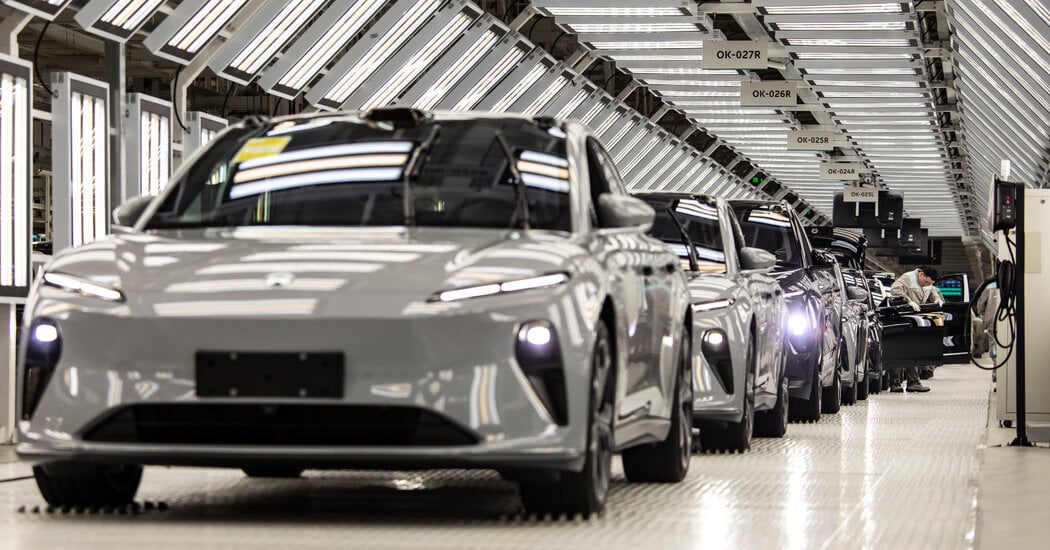- cross-posted to:
- [email protected]
- cross-posted to:
- [email protected]
Biden Calls Chinese Electric Vehicles a Security Threat::The president ordered an investigation into auto technology that could track U.S. drivers, part of a broader effort to stop E.V. and other smart-car imports from China.
their operating systems could send sensitive information to Beijing
Cool. So let’s pass legislation that prevents any auto manufacturer from sending sensitive info to anyone unauthorized by the owner of the car. Just because you buy a car “assembled” in the US doesn’t mean that your data isn’t being harvested, stored improperly, and sold to all bidders.
Don’t stop at cars
China is the largest producer of EVs in the world by far (the next country on the list, Germany doesn’t even come close). In fact, China produces more EVs than the next 4 top producers combined.
The US is running scared because there is absolutely no way they can compete, unless they severely handicap the competition.
So, instead of free competition in Western markets, we have coddled American companies that are “too big to fail” that will continue producing obsolete technologies. If we haven’t already, we’ll start to see Boeing’s product issues in American cars.
Administration officials noted that American auto manufacturers that sold vehicles to customers in China were essentially forced by Chinese officials to use Chinese software in their vehicles.
I do question the amount of lifting the word essentially is doing in the above snippet, but that does sound like grounds to limit the inverse for Chinese imports
No need to question it. Western auto companies in China aren’t independent. They’re nearly always joint 50/50 ventures with Chinese auto companies and are under Chinese government regulation. I know for a fact that at least one American car company has the infotainment software for China written in China while all other regions use completely different software, written in NA.
Well, if the US spies on its own citizens can you imagine the shady shit they’d do on Chinese citizens?
I also wonder if restrictions on software are in response to the US restricting access to Huawei tech in allied nations. This shit is not new.
I also wouldn’t put it past US officials to inflate something for their own purposes - what if the Chinese requirement is for Chinese language software and it got turned around into Chinese software to serve an agenda.
This is one of the reasons the US is looking to restrict Chinese EV imports. And to be clear, they’re so cheap because the CCP is subsidizing the entire Chinese EV industry, since they want to entirely own the market. But that’s not all.
China, as you may know, has a lot of serious problems around privacy and surveillance. More pointedly: it’s a surveillance state. It’s entirely possible that Chinese EVs could be sending back tons of data to servers in China. That data could be related to users and passengers… but it could also be area surveillance and data gathering (i.e. effectively employing multiple cars in a particular area as a distributed integrated sensor system), because modern cars have a shitload of cameras and microphones in them these days. I would be extremely unsurprised if the CCP was leveraging EV data gathering as an intelligence source. Think about it: they could give/sell near-realtime information to anyone they feel like. The CCP themselves is interested, I’m sure, in what’s going on in Taipei right now. They might sell South Korean data to North Korea. They might sell Ukrainian or Moldovan or Latvian or Finnish data to Russia. Those states might then turn around and use that data to try to destabilize the specified target countries, or even to assist with an invasion.
There are a LOT of reasons why letting the CCP own a vast majority of global EV production is a bad idea.
Remember when the Patriot Act was a thing?
Surveillance of your citizens isn’t a CCP only thing.
Yeah. I know. But we’re not talking about that. We’re talking about this.
Whataboutism isn’t going to change what I said, or how accurate what I said is.
It’s not whataboutism, it’s hypocrisy.
It’s really not, and it’s also not really apples to apples.
The Patriot Act, and the level of surveillance it enabled and continues to enable, is absolutely bad, and I am absolutely not defending it.
But the CCP comprehensively surveils its citizenry in ways that would appall people born and raised in the west - think “you were having a bad day last week and you yelled at a rude store clerk, and a camera caught that and flagged it for a party official to review, so now your metro card won’t take you anywhere besides work and home”. That’s a level of granular surveillance and control that’s commonplace in China, and would be absolutely unheard of in a non-authoritarian state.
To get back to the main points I am expressing here:
- the CCP is an authoritarian surveillance state
- companies in mainland China are forced, as a matter of policy, to give the CCP an extreme level of access to basically all of their data (incidentally, this is one of the main reasons the biotech company I work at bailed on China altogether in the last couple years, despite the huge patient demographics we could address there, because their surveillance laws directly collide with a ton of western medical privacy laws)
- the CCP is a geopolitical adversary to much of the west at this point, and is becoming more adversarial
- the CCP has an established pattern and practice of leveraging industrial espionage and reverse engineering to further their own national interests. There are numerous significant examples of this.
Thus, it stands to reason that the CCP, which is footing the bill for a meaningful percentage of their auto industry’s EV development costs, could very plausibly make “throw tons of sensors in there and pipe the data to us” a condition of that assistance.
That example you gave about yelling at a store clerk led to a man being murdered by the police in America (George Floyd).
Tell me you only read the headline
Oh I read the article and found most of it to be rehashed arguments about Huawei.
China is the largest producer of EVs in the world by far (the next country on the list, Germany doesn’t even come close). In fact, China produces more EVs than the next 4 top producers combined.
Whenever I see anyone comparing |absolute| values of anything between China and other countries, I just automatically assume they aren’t thinking very hard. You realize it’s a country of a billion and a half people right?
Okay so you’re saying the US doesn’t stand a chance.
India has a billion and a half people too by the way. Where are India’s EVs?
Okay so you’re saying the US doesn’t stand a chance.
Doesn’t stand a chance at what? Producing more cars than an industrialized country with 4x as many people? Yes I am. Would you say Canada “stands a chance” in that sense compared to the US?
The better question is: what benefit is a country getting for the stuff it makes and sells. GDP per capita is a useful measure because in theory it means every person is getting a larger slice of the country’s productive economic activity. Obviously reality is a lot more complex than that, but it’s certainly not helpful to be even more reductive and just ignore the population factor entirely.
I’m not sure OP is talking about the net distribution of profit though, they’re talking about gross market output. China can flood the EV market with cheap commodities, that’s bad news for American manufacturers because -as op said- they can’t compete. A lot of that is related to population, but that’s kind of irrelevant to the point op is making.
They may be on the way, since India is already the 4th biggest economy in the world and growing fast.
https://hbr.org/2023/09/is-india-the-worlds-next-great-economic-power
Can’t wait for sanctions against India, am I right?
2019 gmc terrain with 70k miles. Vacuum pump grenaded itself inside the engine. $7k to fix, needs entire new head. Do yourself a favor, buy anything but US.
Yeah, but 80% are super cheap crap.
Leave that to the customer to decide. Or is that not the point of the free market?
Not when it comes to things that will kill people.
“Super cheap crap” in this case could lead to the steering binding up and making a car drive into a crowd of people.
The car market is far from free and is probably one of the most regulated markets in the US. Introducing “free market” now to it would be quite catastrophic.
They still wouldn’t be able to sell anything that doesn’t meet the standards in place, so I really don’t get your comment.
The government can’t inspect 100% of every vehicle. Chinesium crap is notorious for swapping out parts. If the company is based in the US or has significant ownership/operations in the USA then you can take actions against the company…
A Chinese company has no care in the world about US operations. They’ll just change name and peddle it under a new name. (see dropshipping problems we have now on all the major e-tail platforms).
Curious, are planes manufactured by Boeing being considered in your comparison of Chinese made vs US made products?
Well that’s a good question… I would normally say no… But a little googling brings up results like
https://www.yicaiglobal.com/news/boeing-expands-chinese-parts-factory-for-second-time
https://interestingengineering.com/culture/boeing-company-opens-new-chinese-factory-amid-us-chinese-trade-warand
https://simpleflying.com/boeing-777x-parts-manufacture-site/
According to the Global Times, over 10,000 Boeing aircraft have parts made in China.
And then you look at the problems Boeing have recently faced… And you have to wonder… newer manufacturing facilities in China… and now we’re seeing an uptick in problems at Boeing. Definitely a hell of a coincidence, but ultimately hard to tie them together as a causal relationship.
It is not like all the auto manufacturers are trying to do right now. They see this as a secondary opportunity to generate even more money from their customers and expand their SaaS offerings.
The future is grim.
China and America are not the same but the solution works against all actors: permit users to audit and change the code so dependencies on servers can be removed or replaced with ones of our choice. Without the source code to learn what it’s actually doing then all software is potentially a security threat, at best it’s just not yet guilty of being malware or having anti-features.
Why should every car owner have to also be a tech nerd or security specialist just to guarantee their car is safe to drive and own? They should be guaranteed safe before they are even sold.
Of course, consumers should have full control over the technology they buy, but it should be safe and secure before it is even sold in the first place. 
The only way to know it is safe is 3rd parties auditing it. The manufacture saying “trust me bro” ain’t it and a government audit that doesn’t show their work could be bullshit too. A single tech nerd or security specialist is in the same boat as the regular Joe - it’s a group effort. Non-techies can contribute in other ways (e.g. reporting bugs).
That’s why government agencies should be transparent and better funded
To be so transparent that we can actually verify the government’s findings means a 3rd party is doing the same job the government did. Anything less is the government saying “trust us”. [Edit to clarify what I meant] It’s cheaper for a bad company to pay for lobbyists or buyout a few politicians than to somehow buyout every 3rd party.
The job of government is to take care of the people by providing trustworthy services that protect us. If they don’t function properly, it is a job of the people to make sure that they do. I do not accept the idea that this is impossible. I’m sorry that you cannot. But I will not accept the argument that this is impossible.
Your argument only convinces me that we must work harder to create government services that are better and more trustworthy. I will never ever accept that private industry is superior, because their interest will only ever be to serve the shareholder, and shareholders can never be trusted to serve anything other than profit. Therefore, your argument will always be flawed. Especially concerning the interest of the individual, as the shareholder and the profit holder will always want to violate that, and will never be responsible or accountable to the people or the public.
To that end, your argument is against corruption. To that out, the only real force to do that is the public, and a publicly accountable, democratic framework can be the only feasible means to that, never a privately-shrouded, corporate shareholder model.
Non-profits and charities also create software but it’s like verifying a scientific experiment: doesn’t matter who did it first if we can verify their results.
Sadly, bad incentives trend politicians to appeal to just select groups needed to win. Many countries use unrepresentative voting systems which trend to a 2 party system, permits jerrymandering, etc. What can I do about my government?
At least I can try to avoid proprietary software - if I needed a car I would look for one which comes with open source software, or buy a dumb while I still can.
You make the false argument that public systems can never be relied on therefore, we must only rely on private systems. In reality, private systems are always fascist, and public systems need only be purged of corruption. 
I’d rather fight possible corruption than certain fascism. And I certainly don’t trust an interlocutor that lies and tells me only fascism can be trusted, and that the public cannot be.
And I call them the closest anyone in the States will get to an affordable EV. Biden is such a suckup at times. He’s just writing a list of reasons for voters to stay home.
There are always many reasons to stay home in any election. Most of them are selfish or deluded
Aside from the security risk, they’re probably mitigating the amount of traffic incidents that are bound to occur when the crappily coded cars enter the market
This is the best summary I could come up with:
President Biden took steps on Thursday toward blocking internet-connected Chinese cars and trucks from entry to the American auto market, including electric vehicles, saying they posed risks to national security because their operating systems could send sensitive information to Beijing.
China has rapidly scaled up its production of electric vehicles in recent years, setting it on a collision course with Mr. Biden’s industrial policy efforts that seek to help American automakers dominate that market at home and abroad.
Administration officials are eyeing other steps to further impede imports of Chinese vehicles, which have already surged through European markets, as a result of low prices driven in part by significantly lower labor costs.
The Treasury Department has already proposed rules meant to limit China’s ability to supply materials for cars and trucks that qualify for a $7,500 electric vehicle tax credit included in Mr. Biden’s signature climate bill.
The Commerce Department investigation announced on Thursday grew from a series of conversations that administration officials had with automakers last fall, after the settlement of a United Automobile Workers strike during which Mr. Biden stood with the union and joined a picket line.
Biden aides began to grow concerned about what might happen if the United States did not impose similar restrictions on Chinese software, which administration officials say only a handful of cars in America run on today.
The original article contains 808 words, the summary contains 226 words. Saved 72%. I’m a bot and I’m open source!








